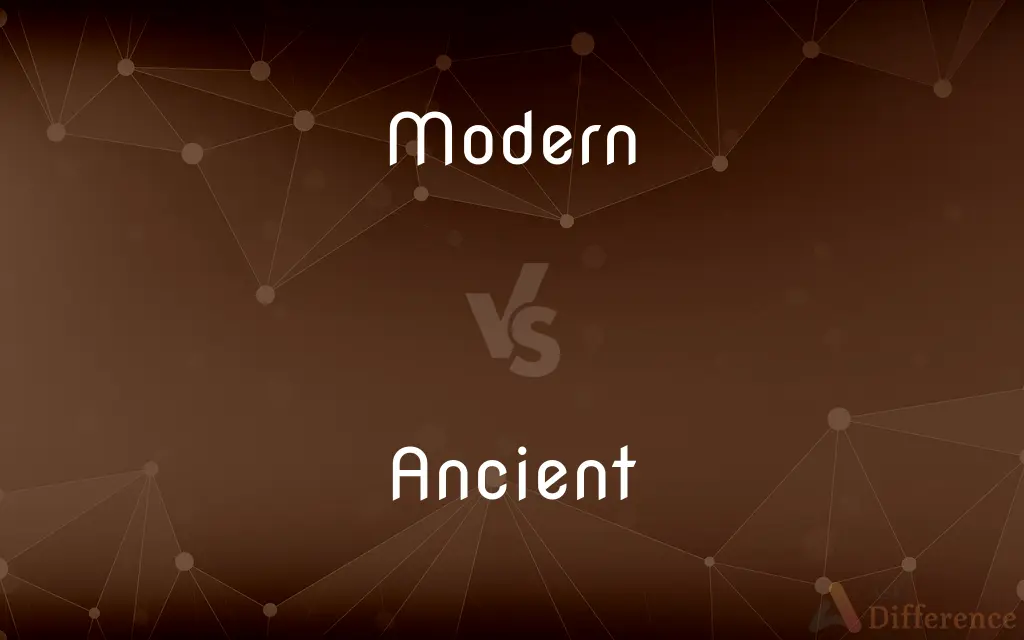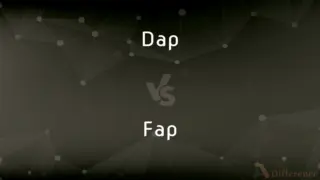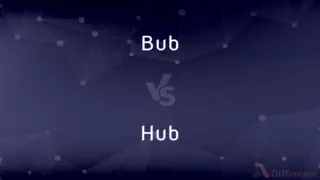Modern vs. Ancient — What's the Difference?
By Maham Liaqat & Urooj Arif — Updated on March 11, 2024
Modern refers to the present or recent times, characterized by innovation and technology, while ancient describes periods or objects from the distant past, often centuries old.

Difference Between Modern and Ancient
Table of Contents
ADVERTISEMENT
Key Differences
Modern relates to the current era or very recent periods, marked by technological advancements, contemporary culture, and current societal norms. It often implies a break from traditional or historical ways of thinking and doing. In contrast, ancient refers to times or objects that belong to the distant past, often thousands of years ago, and are associated with historical civilizations, traditions, and knowledge that have significantly influenced the present.
In terms of technology, modern is synonymous with cutting-edge, digital, and rapidly evolving tech that shapes our daily lives, from smartphones to artificial intelligence. Ancient technology, however, refers to the innovations of early civilizations, like the wheel, aqueducts, or the use of bronze, which laid the foundational stones for future developments.
Culturally, modern societies are characterized by a dynamic mix of global influences, diverse values, and a continuous push for social progress and change. Ancient cultures, on the other hand, were often more homogenous within their societies, with deep-rooted traditions, rituals, and beliefs that governed life and were passed down through generations.
Architecturally, modern design emphasizes functionality, simplicity, and the use of new materials like steel and glass, often seeking to break from historical styles. Ancient architecture is renowned for its monumental structures, intricate designs, and the use of natural materials, reflecting the technological capabilities and aesthetic values of the time.
In literature and art, the modern movement often involves experimentation with form, narrative, and perspective, challenging traditional conventions. Ancient literature and art, while diverse across different cultures, typically adhered to well-established forms and often served religious or ceremonial purposes, showcasing the myths, values, and histories of their people.
ADVERTISEMENT
Comparison Chart
Time Period
Present or recent past.
Distant past, often centuries or millennia ago.
Technology
Digital, cutting-edge, rapidly evolving.
Foundational innovations of early civilizations.
Culture
Diverse, global influences, continuous change.
Homogenous, deep-rooted traditions and rituals.
Architecture
Functional, simple, use of new materials.
Monumental, intricate, use of natural materials.
Literature/Art
Experimental, challenges traditional conventions.
Adhered to established forms, served religious/ceremonial purposes.
Compare with Definitions
Modern
Pertaining to the current era, characterized by technological innovation.
Modern cities are often defined by skyscrapers and digital infrastructure.
Ancient
Belonging to the distant past, often associated with early civilizations.
Ancient Egypt is renowned for its pyramids and hieroglyphics.
Modern
Involves recent advancements in science and technology.
Modern medicine has greatly extended life expectancy.
Ancient
Cultures were characterized by enduring traditions and rituals.
Ancient Greek culture had a profound impact on Western civilization.
Modern
Reflects contemporary cultural trends and social progress.
Modern art often challenges traditional notions of aesthetics.
Ancient
Technology was based on the resources and knowledge of the time.
Ancient Romans developed sophisticated aqueduct systems.
Modern
Architecture focuses on minimalism and functionality.
Modern architecture often incorporates sustainable materials.
Ancient
Literature and art served to document history and serve religious purposes.
Ancient epic poems like the Iliad recounted heroic tales and divine interactions.
Modern
Literature and media explore diverse perspectives and formats.
Modern novels may experiment with non-linear storytelling.
Ancient
Architecture was monumental, reflecting the society's values and capabilities.
The ancient city of Petra is known for its rock-cut architecture.
Modern
Of or relating to recent times or the present
Modern history.
Ancient
A standard, flag, or ensign.
Modern
Characteristic or expressive of recent times or the present; contemporary or up-to-date
A modern lifestyle.
A modern way of thinking.
Ancient
Belonging to the very distant past and no longer in existence
The ancient civilizations of the Mediterranean
Modern
Of or relating to a recently developed or advanced style, technique, or technology
Modern art.
Modern medicine.
Ancient
An old man
A solitary ancient in a tweed jacket
Modern
Avant-garde; experimental.
Ancient
Of, relating to, or belonging to times long past, especially before the fall of the Western Roman Empire (AD 476)
Ancient cultures.
Modern
Often Modern(Linguistics) Of, relating to, or being a living language or group of languages
Modern Italian.
Modern Romance languages.
Ancient
Of great age; very old
"The males live up to six months—positively ancient, for a bee" (Elizabeth Royte).
Modern
One who lives in modern times.
Ancient
(Archaic) Having the qualities associated with age, wisdom, or long use; venerable
"You seem a sober, ancient Gentleman by your habit" (Shakespeare).
Modern
One who has modern ideas, standards, or beliefs.
Ancient
A very old person.
Modern
(Printing) Any of a variety of typefaces characterized by strongly contrasted heavy and thin parts.
Ancient
A person who lived in times long past.
Modern
Pertaining to a current or recent time and style; not ancient.
Our online interactive game is a modern approach to teaching about gum disease.
Although it was built in the 1600s, the building still has a very modern look.
Ancient
The peoples of the classical nations of antiquity.
Modern
(history) Pertaining to the modern period (c.1800 to contemporary times), particularly in academic historiography.
Ancient
The ancient Greek and Roman authors.
Modern
Someone who lives in modern times.
Ancient
(Archaic) An ensign; a flag.
Modern
Of or pertaining to the present time, or time not long past; late; not ancient or remote in past time; of recent period; as, modern days, ages, or time; modern authors; modern fashions; modern taste; modern practice.
Ancient
(Obsolete) A flag-bearer or lieutenant.
Modern
New and common; trite; commonplace.
We have our philosophical persons, to make modern and familiar, things supernatural and causeless.
Ancient
Having lasted from a remote period; having been of long duration; of great age, very old.
An ancient city
An ancient forest
Modern
A person of modern times; - opposed to ancient.
Ancient
Existent or occurring in time long past, usually in remote ages; belonging to or associated with antiquity; old, as opposed to modern.
An ancient author
An ancient empire
Modern
A contemporary person
Ancient
(history) Relating to antiquity as a primarily European historical period; the time before the Middle Ages.
Modern
A typeface (based on an 18th century design by Gianbattista Bodoni) distinguished by regular shape and hairline serifs and heavy downstrokes
Ancient
(obsolete) Experienced; versed.
Modern
Belonging to the modern era; since the Middle Ages;
Modern art
Modern furniture
Modern history
Totem poles are modern rather than prehistoric
Ancient
(obsolete) Former; sometime.
Modern
Relating to a recently developed fashion or style;
Their offices are in a modern skyscraper
Tables in modernistic designs
Ancient
A person who is very old.
Modern
Characteristic of present-day art and music and literature and architecture
Ancient
A person who lived in ancient times.
Modern
Ahead of the times;
The advanced teaching methods
Had advanced views on the subject
A forward-looking corporation
Is British industry innovative enough?
Ancient
One of the senior members of the Inns of Court or of Chancery.
Modern
Used of a living language; being the current stage in its development;
Modern English
New Hebrew is Israeli Hebrew
Ancient
(obsolete) A senior; an elder; a predecessor.
Ancient
A flag, banner, standard or ensign.
Ancient
The bearer of a flag; ensign
Ancient
Old; that happened or existed in former times, usually at a great distance of time; belonging to times long past; specifically applied to the times before the fall of the Roman empire; - opposed to modern; as, ancient authors, literature, history; ancient days.
Witness those ancient empires of the earth.
Gildas Albanius . . . much ancienter than his namesake surnamed the Wise.
Ancient
Old; that has been of long duration; of long standing; of great age; as, an ancient forest; an ancient castle.
Remove not the ancient landmarks, which thy fathers have set.
An ancient man, strangely habited, asked for quarters.
Ancient
Known for a long time, or from early times; - opposed to recent or new; as, the ancient continent.
A friend, perhaps, or an ancient acquaintance.
Ancient
Dignified, like an aged man; magisterial; venerable.
He wrought but some few hours of the day, and then would he seem very grave and ancient.
Ancient
Experienced; versed.
Though [he] was the youngest brother, yet he was the most ancient in the business of the realm.
Ancient
Former; sometime.
They mourned their ancient leader lost.
Ancient
Those who lived in former ages, as opposed to the moderns.
Ancient
An aged man; a patriarch. Hence: A governor; a ruler; a person of influence.
The Lord will enter into judgment with the ancients of his people, and the princes thereof.
Ancient
A senior; an elder; a predecessor.
Junius and Andronicus . . . in Christianity . . . were his ancients.
Ancient
One of the senior members of the Inns of Court or of Chancery.
Ancient
An ensign or flag.
More dishonorable ragged than an old-faced ancient.
Ancient
The bearer of a flag; an ensign.
This is Othello's ancient, as I take it.
Ancient
Belonging to times long past especially of the historical period before the fall of the Western Roman Empire;
Ancient history
Ancient civilizations such as those of the Etruscans and Sumerians
Ancient Greece
Ancient
Very old;
An ancient mariner
Common Curiosities
What defines the modern era?
The modern era is characterized by rapid technological advancements, contemporary culture, and current societal norms.
What are key differences in modern and ancient cultures?
Modern cultures are diverse with global influences, whereas ancient cultures had more homogenous values and deep-rooted traditions.
How does modern technology differ from ancient technology?
Modern technology is digital and rapidly evolving, while ancient technology includes foundational innovations like the wheel or bronze tools.
How do modern and ancient architectures contrast?
Modern architecture emphasizes functionality and new materials, while ancient architecture is known for monumental structures and natural materials.
How has the transition from ancient to modern impacted society?
The transition has led to significant changes in technology, governance, and social norms, driving progress but also creating new challenges.
What role does archaeology play in understanding ancient cultures?
Archaeology is crucial for uncovering the artifacts, structures, and texts that provide insight into ancient cultures and their contributions to human history.
What is considered ancient?
Ancient refers to periods or objects from the distant past, often thousands of years old, associated with early civilizations.
Can ancient principles influence modern practices?
Yes, many modern practices in fields like philosophy, mathematics, and governance are influenced by ancient principles.
Is the distinction between modern and ancient always clear?
The distinction can be blurred, as some societies may retain ancient traditions within a modern context, and modern movements often revisit ancient ideas.
How do modern and ancient perspectives on nature differ?
Modern perspectives are often shaped by environmental science and sustainability, while ancient views were more directly linked to mythology and the sacredness of the natural world.
Are modern art and literature completely detached from ancient forms?
While modern art and literature often experiment with new forms, they can still be influenced by ancient themes, stories, and techniques.
How are ancient texts preserved and studied in the modern era?
Ancient texts are preserved through meticulous conservation efforts and studied using both traditional scholarship and modern technologies.
Can modern technology help preserve ancient sites and artifacts?
Yes, technologies like 3D scanning, digital archiving, and non-invasive archaeology techniques are instrumental in preserving ancient heritage.
What lessons can the modern era learn from ancient civilizations?
Lessons include the importance of sustainable living, the value of community and ritual, and the enduring nature of human creativity and resilience.
What is the impact of globalization on the distinction between modern and ancient?
Globalization can dilute cultural distinctions but also facilitates the exchange of ideas and practices between modern and ancient cultures, leading to a richer global heritage.
Share Your Discovery

Previous Comparison
Dap vs. Fap
Next Comparison
Bub vs. HubAuthor Spotlight
Written by
Maham LiaqatCo-written by
Urooj ArifUrooj is a skilled content writer at Ask Difference, known for her exceptional ability to simplify complex topics into engaging and informative content. With a passion for research and a flair for clear, concise writing, she consistently delivers articles that resonate with our diverse audience.















































